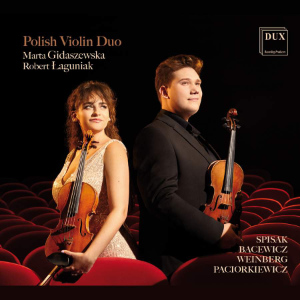
Grażyna Bacewicz (1909-1969)
Suite for Two Violins (1943)
Tadeusz Paciorkiewicz (1916-1998)
Sonatina for Two Violins (1955)
Grażyna Bacewicz
Easy Duets on Folk Themes for Two Violins (1945)
Michał Spisak (1914-1965)
Suite for Two Violins (1958)
Mieczysław Weinberg (1919-1996)
Sonata for Two Violins Op.69 (1959)
Polish Violin Duo
rec. 2022, Concert Hall of the Krzysztof Penderecki European Centre for Music, Lusławice, Poland
DUX 1887 [67]
Music for two violins may be an acquired taste, but discs such as this help make it popular, particularly for music from relatively recent past. This programme demonstrates Polish composers’ writing for two violins in the sixteen years around mid-twentieth century. For what it’s worth, of the four featured here, the relevant Wikipedia entry only lists Weinberg.
The music of Grażyna Bacewicz, a major talent, is now quite amply recorded, and steadily gains more admirers. The sprightly opening to the Suite for Two Violins is an infectious tune. Each of the six movements is engaging, with a main theme plus harmonic developments. The strong folk influence gives the work additional appeal. The Easy Duets on Folk Themes comprise seven tiny but perfectly formed teaching miniatures. Again, there is the composer’s affecting energy at their heart.
Tadeusz Paciorkiewicz began his studies at the organ, but the present Sonatina for Two Violins shows his mastery of violin writing. A fast-paced opening movement precedes a melancholy but achingly beautiful middle movement; it is divided into three sections, the central one more uplifting due to its motoric drive, the outer ones delighting in pathos. The Presto finale is bursting with effervescence and joie de vivre.
In the correspondence with Grażyna Bacewicz and another friend, Michał Spisak dismissed his Suite for Two Violins as a trifle. This is an undeserved description of a deeply satisfying work. It showcases Spisak’s ability to write refreshingly simple but engaging music that has much to say. The work is more modern in outlook than those of Bacewicz and Paciorkiewicz, but tuneful and harmonically interesting.
Mieczysław Weinberg’s story – flight from Nazi-occupied Poland to the Soviet Union, a life-long friendship with Dmitri Shostakovich, their mutual musical influences, and posthumous fame – is now well-known. The Sonata for Two Violins confirms Weinberg’s skill in all genres he chose to practice; there is never a dull moment in his music, nor a superfluous note. This work differs considerably from much of his chamber music, and is a world away from that of Shostakovich. The overarching feeling is resignation, with overtones of melancholy and reflection. Much of it may be sad, but all of it is most beautiful.
The more I listened to this disc, the more it grew on me, until I had to put it on repeatedly to gain more insights into the music. This feeling was due in no small way to the performers, Marta Gidaszewska and Robert Łaguniak who are completely in tune with each other (pun intended). Their timing, their reverence for the music and their enjoyment are on full display. Highly recommended.
Steve Arloff
Help us financially by purchasing from




















